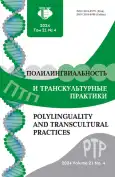Teaching of the Russian Language to Indian Studentsin a Multilingual Environment
- Authors: Rumyantseva N.M.1, Rubtsova D.N.1, Anand A.1
-
Affiliations:
- RUDN University
- Issue: Vol 21, No 4 (2024)
- Pages: 787-795
- Section: ARSENAL
- URL: https://journal-vniispk.ru/2618-897X/article/view/326901
- DOI: https://doi.org/10.22363/2618-897X-2024-21-4-787-795
- EDN: https://elibrary.ru/EKWQCS
- ID: 326901
Cite item
Full Text
Abstract
This study is devoted to the problems of teaching the Russian language in India. The relevance of this work is to analyze the development of relations between India and Russian Federation and the recommendations for the ethno-methodic nature of teaching of the Russian language in the context of multilingualism. Research methods: the study of open-source literary sources, the study of the methodology of teaching Russian as a foreign language (RFL) in India. In order to better understand the changes taking place in the field of teaching RFL, the authors briefly outline the history of the development of Russian studies from the moment of decolonization to the present time. The article notes that the history of the development of Russian studies in India has several stages. The first stage begins with the signing of the agreement “On cultural, scientific and technical cooperation” in 1960. The second stage, which began with the signing of the agreement “Creation of Russian Studies Institute in New Delhi”, characterized by the inclusion of curriculum of the Jawaharlal Nehru University and the beginning of teaching in a number of schools in India. The third one is the stage of decreasing interest in learning Russian, associated with related to the collapse of the USSR and the recall of a large number of Russian teachers to their homeland. related to the collapse of the USSR and the recall of a large number of Russian teachers to their homeland. Recently, there has been a revival of interest in learning Russian in India. In this regard, the authors of the article recommend that in the process of teaching RFL: to rely on the intermediary language; to use the principles of a nationally oriented methodology (ethnomethodics), which allows taking into account the ethnopsychological characteristics of Indian students and ethnos when teaching the Russian language; to create textbooks and teaching aids that meet not only the modern requirements of the teaching methodology of the RFL, but also the interests of a specific category of students. These principles of ethnometrics contribute both to improving the effectiveness and quality of teaching the Russian language outside the language environment, and to increasing motivation to study the Russian language.
About the authors
Natalia M. Rumyantseva
RUDN University
Author for correspondence.
Email: rumyantseva_nm@pfur.ru
ORCID iD: 0000-0001-7724-7317
Doctor of Pedagogical Sciences, Professor, Senior Teacher, Department No. 3, Institute of the Russian Language
10, building 3, Miklukho-Maklaya St, Moscow, 117198, Russian FederationDina N. Rubtsova
RUDN University
Email: rubtsova_dn@pfur.ru
ORCID iD: 0000-0002-7552-8147
Doctor of Pedagogical Sciences, Professor, Senior Teacher, Department No. 3, Institute of the Russian Language
10, building 3, Miklukho-Maklaya St, Moscow, 117198, Russian FederationAbhishek Anand
RUDN University
Email: 1042225300@pfur.ru
ORCID iD: 0009-0007-0555-0027
postgraduate student, is a Doctor of Pedagogical Sciences, Professor, Senior Teacher, Department No. 3, Institute of the Russian Language
10, building 3, Miklukho-Maklaya St, Moscow, 117198, Russian FederationReferences
- Zherebilo, T.V. (author-compiler). 2011. Sociolinguistics: Dictionary and Reference. Novosibirsk: Nazran, pp. 145–149. Print. (In Russ.)
- Sigorsky, A.A. 2008. Everything is mixed up in the Hindi-language area: languages, dialects, subdialects. Moscow: Eastern Literature publ., pp. 349–359. Print. (In Russ.)
- Totavar, V. 2007. “Russian Studies in India.” Bulletin of Novgorod State University, no 43, pp. 12–14. Print. (In Russ.)
- Wagner, V.N. 2001. Methods of Teaching Russian to English-Speaking and French-Speaking Students. Moscow: Vlados publ., р. 12. Print. (In Russ.)
- Krasnova, G.A. 2002. Open Education. Civilizational Approaches and Prospects. Moscow: RUDN publ. Print. (In Russ.)
- Vyatutnev, N.M. 1984. Teaching Methods and Textbook Theory. Moscow: Russian language publ. Print. (In Russ.)
Supplementary files









